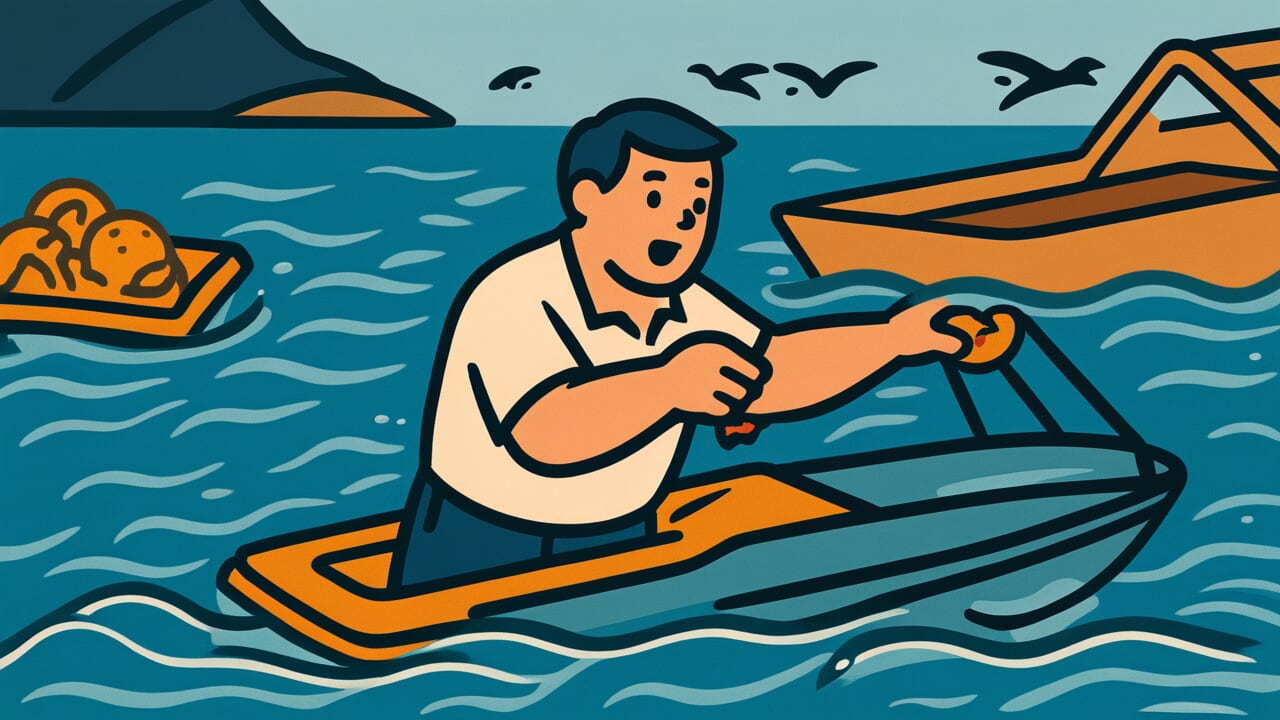How to Read “Abandon provisions and sink the ship”
Kate wo sutete fune wo shizumu
Meaning of “Abandon provisions and sink the ship”
“Abandon provisions and sink the ship” is a proverb that warns against the foolish act of destroying the very foundation you need to survive or succeed.
Both provisions (food) and the ship are absolutely necessary for survival. Yet this saying describes self-destructive behavior where you throw away these essentials with your own hands.
This proverb applies to situations where you lose something important long-term because of short-term emotions or impulses.
For example, destroying important relationships in a moment of anger. Or losing your credibility for immediate profit. Or carelessly giving up a stable source of income.
This teaching remains crucial in modern society. An emotional outburst on social media can ruin your future career.
A hasty decision can instantly destroy trust you’ve built over years. This proverb teaches us to think calmly about what truly matters to us.
It reminds us to consider how we should act to protect those important things.
Origin and Etymology
No clear record exists of when this proverb first appeared in literature. However, we can understand its origins by examining the words themselves.
“Provisions” refers to food, especially the necessities that keep you alive during sea voyages or journeys.
“Sink the ship” means to make the ship itself go under. A ship is both your means of transportation and your only foothold at sea.
This proverb expresses the foolishness of losing two elements essential for survival at the same time: food and the ship.
Japan is an island nation where maritime trade has played a vital role since ancient times.
On a ship at sea, provisions and the vessel itself matter more than anything else. Without food, you starve. If the ship sinks, you drown.
Willingly abandoning both is essentially an act of suicide.
This lesson probably originated among sailors and eventually spread to people on land.
It became a common proverb warning against “destroying your own foundation for survival.” These words likely came from the urgent warnings of people who knew the harshness of the sea.
Usage Examples
- Quitting your job over a momentary emotion is like “abandon provisions and sink the ship”
- He destroyed his own relationship of trust with clients, truly “abandon provisions and sink the ship”
Universal Wisdom
“Abandon provisions and sink the ship” offers deep insight into humanity’s self-destructive impulses.
Why do people destroy what they know is precious to them?
Our ancestors had a clear answer to this question. Humans have a weakness where immediate emotions and desires overpower them, making them lose long-term perspective.
Anger, impatience, pride, momentary pleasure. These emotions are intense and easily cloud our reason.
What’s interesting is that this proverb uses the phrases “abandon yourself” and “sink yourself,” not “destroyed by others.”
It’s not an external attack but an internal collapse. Our ancestors understood that this is humanity’s most fearsome enemy.
Thinking deeper, this proverb also highlights the human contradiction of “knowing but not doing.”
Everyone understands the importance of provisions and the ship. Yet they still abandon them. This contradiction defines our humanity and represents a challenge we must overcome.
Even as times change, this human nature remains constant. That’s why this proverb continues to speak to us today.
When AI Hears This
Cutting off your escape route might look like a foolish decision that reduces your options.
But actually, in game theory, this is called a “commitment device” and it’s an extremely rational strategy.
Common sense says having an escape route is advantageous. But in negotiations or conflicts, creating a situation where you can’t escape becomes your strength.
Why? Because it changes your opponent’s calculations. If the enemy thinks “they have no food, they’ll run if they lose,” they’ll attack aggressively.
But seeing an army that abandoned provisions, they must conclude “they have no retreat, they’ll fight to the death.” By making your actions predictable, you change your opponent’s behavior.
This can be explained through a theoretical model called the “Chicken Game.” Two cars race toward each other head-on, and whoever turns first loses.
What happens if one driver throws their steering wheel out the window? They can’t turn anymore. The opponent rationally concludes “they can’t avoid collision, so I must turn.”
Irreversible actions are more powerful than verbal promises. Why? Because you can’t lie. The fact that you abandoned provisions can’t be erased.
This “irreversibility” becomes the most credible message to your opponent. What looks like self-destruction is actually the strongest move in information warfare.
Lessons for Today
This proverb teaches modern people the importance of “the ability to identify what must be protected.”
Our lives have foundations we cannot afford to lose. These differ from person to person. Health, family, trust, learning opportunities, income sources.
These are the provisions and ship that support your life’s voyage.
Modern society forces many choices upon us. Career changes, cutting off relationships, major decisions.
At those moments, pause and consider whether you’re being swept away by temporary emotions. Will this action truly benefit your future?
Or will it become an irreversible choice, like abandoning provisions and sinking the ship?
The key isn’t to deny your emotions. Anger and sadness are natural human responses.
But before those emotions control you and make you destroy your foundation, take a deep breath. How will tomorrow’s you, or next year’s you, view today’s decision?
You have the power to protect your own life. Trust that power and make wise choices.



Comments